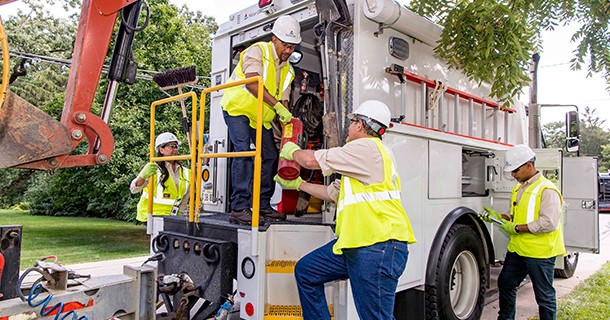Appliance Connectors
According to the Consumer Product Safety Commission, certain older gas connectors may be dangerous. Gas connectors are corrugated metal tubes used to connect gas appliances to fuel gas supply pipes. These older brass connectors have a serious flaw in how their tubing was joined to their end pieces.
Over time, the end pieces can separate from the tubing and cause a serious natural gas leak, explosion or fire. While these dangerous uncoated brass connectors have not been made for more than 20 years, many of them are still in use. And the possibility of failure still exists. The older these connectors get, the greater the possibility of failure.
Uncoated brass connectors should be replaced immediately. Although not all uncoated connectors have this flaw, it is very difficult to tell which ones do. Therefore, any uncoated brass connector should be replaced immediately with a new plastic-coated brass connector or a new stainless steel connector.
Connectors can wear out from too much moving, bending, or corrosion. Moving the appliance, even slightly, whether to clean behind it or to inspect its gas connector, can cause the complete failure of one of these older weakened connectors and possibly result in a deadly fire or explosion. As a rule, you should replace the connectors whenever the appliance is replaced or moved from its location.
Only a qualified professional should check or replace connectors. Do not move your appliance to check the connector! They can easily break if moved even slightly. For your safety, make sure a qualified professional performs the inspection and immediately replaces any uncoated brass connectors with stainless steel or plastic-coated connectors.
Good and Bad Connectors
Examples of unacceptable uncoated brass appliance connectors
Tubing has broken off the end piece.
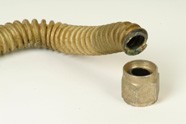
Tubing has corroded, causing a hole.
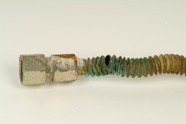
No visible defect, although all uncoated brass connectors need to be replaced.
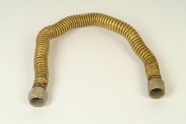
Examples of acceptable appliance connectors:
Uncoated, stainless steel connector.
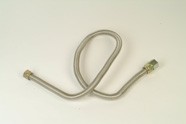
Coated stainless steel connector.
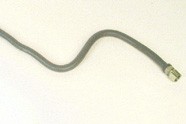
Coated stainless steel connector.
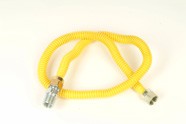
All appliances should be inspected for uncoated brass appliance connectors. Most dryers, ranges, ovens and cook tops have flexible appliance connectors as opposed to hard piping.
Dryer with uncoated brass connector - unacceptable
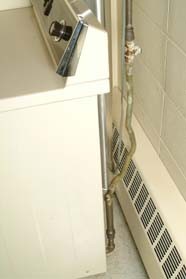
Stove with uncoated brass connector - unacceptable
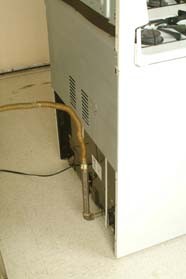
Dryer with coated stainless steel connector - acceptable
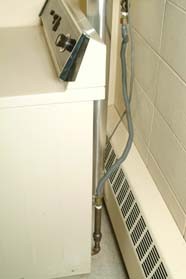
Stove with uncoated stainless steel connector - acceptable
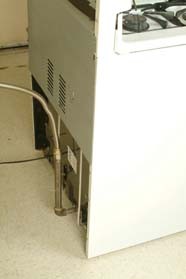
Appliance Connector FAQ
What are appliance connectors?
Gas appliance connectors are corrugated metal tubes used to connect your home's gas appliances to fuel gas supply pipes.
Tell me about the different types of appliance connectors.
There are three types of acceptable appliance connectors:
- plastic-coated brass
- uncoated stainless steel
- plastic-coated stainless steel, which can be gray or yellow
Unacceptable, dangerous connectors are those that are uncoated brass.
Which appliances should have flexible connectors and which should have solid piping leading to the appliance?
Your dryer, stove, range and cook top probably have flexible connectors if they use natural gas. It is recommended that your water heater and furnace have solid piping.
How do I know if my connectors are uncoated brass (the dangerous kind)?
If your appliance is more than 20 years old, there is a good chance that it may have an uncoated brass connector. The only safe way to tell is to have a qualified contractor check. DO NOT attempt to check them yourself.
Why is it dangerous to move an appliance myself?
Moving the appliance, even slightly, whether to clean behind it or to inspect its gas connector, can cause complete failure of an older weakened connector and possibly result in a gas leak inside your home
What should I do if I move my appliance and then smell gas?
If you smell a strong, persistent natural gas odor or hear gas leaking:
- Leave the house immediately, leaving doors and windows open as you leave. Do not open windows if they're not already open.
- Do not use your telephone or appliances, do not light a match, or turn light switches on or off. Sparks could ignite natural gas.
- Call Nicor Gas (888.Nicor4u) from a neighbor's house. Remain there until emergency personnel arrive.
Where can I purchase appliance connectors?
Appliance connectors can be purchased at any hardware or home improvement store. However, a qualified contractor should always install them.
Can I install new or replace old appliance connectors by myself?
Only a qualified professional should check or replace connectors.
I've checked my connectors and know they're uncoated brass. I only want to schedule a replacement.
In order for Nicor Gas to replace your connectors, we must conduct the inspection.
I'm moving and have approved appliance connectors. Can I take them with me?
As a rule, you should replace the connectors whenever the appliance is replaced or moved from its location.
I've recently built a new home. Would a new home have uncoated brass appliance connectors?
To our knowledge, these dangerous uncoated brass connectors have not been made for more than 20 years, although it is always good to have them inspected.
My landlord pays my gas bill. How do I go about having my appliance connectors inspected?
We suggest that you arrange for an inspection through your landlord or property management company.
Who can inspect or install appliance connectors for me?
Only have a qualified HVAC contractor inspect and install appliance connectors.
I've had uncoated brass appliance connectors for a long time and nothing has happened. Why am I now being told they are unsafe?
Although not all uncoated connectors have this flaw, it is very difficult to tell which ones do. Therefore, any uncoated brass connector should be replaced immediately with a new plastic-coated brass connector or a new stainless steel connector. We have been telling customers about appliance connector hazards for several years. Because this is such an important safety issue, we are increasing efforts to make customers aware of the dangers.

